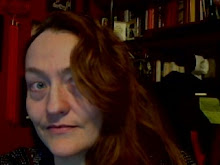I've been thinking a lot about 'purple prose' versus 'literary modernism' and 'efficient prose', and I find I'm with Mr. Fry on this topic.
The current literary style that calls for writers to go through their final draft and remove words like : that, really, great, just, a lot, interesting, wonderful, very, sure, often, usually, many, and most, because they 'are slimy and slippery and lack value,' just make me seethe. A lot.
It's true, if you can cut a word from a sentence and not change the meaning, then yes the word is superfluous, and you ought to consider whether to cut it... or not. But the error there lies in the author's execution, not in the inherent worthiness of the words themselves. Truth is that each and every word on that list has meaning, use, solidity, emphasis, and yes, dammit, VALUE, if it is used with joy, with heart, and with a love of the language in which it flows. And when it is used just where it belongs, by someone who has a love for, and a skill with the component parts of his language.
I will never be a fashionable writer, I think, and that's because I just love words too much. I won't cut them out and throw them away just because they're adverbs. I will wander by the orphaned adjectives that other writers hack off, pick them up, dust them off, and give them homes in my work, and offer apology to no editor over it. I'm willing to use synonyms of said where I feel they fit. I'm not scared of long sentences that don't conjugate out in a straight line. I find I rather like them, in fact.
Is my work descriptive? Is my work rich with emotional sensation, and sensory information? Is my work florid, purple, and overly wordy? Fuck if I know. Fuck, in fact, if I care overly, because it all depends on whom you ask -- ask my target audience, and they're happy to have someone who writes prose that doesn't feel like a cage on a hard concrete floor, populated with brittle people and sharp ideas. Ask MY readers, and they're happy to have phrases and passages stick with them like song lyrics long after they've finished the work. Ask MY readers, and some of them will even quote the stories they loved.
Ask the readers who are decidedly not in my target audience, and they're disgusted at having to read more words than they like to in order to get the story's plot. They're scornful of my descriptors, bored with knowing the details I've given, amused by my adjectives, annoyed by my compound sentences, and dismissive of my shameless love affair with words. And frankly, I'd RATHER that they didn't read my work. Because there are other writers out there who are entirely set up to make their modernist tastes happy, and there's no need for someone who prefers Bauhaus to endure Baroque. But neither is there any need to force an Art Nouveau writer to practice Cubist Abstraction prose in order to grant her work any merit.
I am not a modernist writer. I write to the audible, if you will. I write with half an ear turned toward saying the words out loud, to reading them out and shaping them on my tongue to a room full of ears. Maybe this is born of my innate talent for performing, or maybe this is just the way I experience the act of writing, but to me, if it sounds empty, constipated and sparse, I cannot find it to my liking. Give me a story with comfortable curves, so that the sharp angles and narrow turns will be the more harrowing in contrast. Give me rich colours to offset the bleak shadows that will creep across it. Give me depth of feeling, and the words that know their way around it -- I'm not scared of them.
Even if they are 'slimy and slippery and lack value', I can and will put them to good work.
Friday, September 2, 2011
Subscribe to:
Post Comments (Atom)



No comments:
Post a Comment